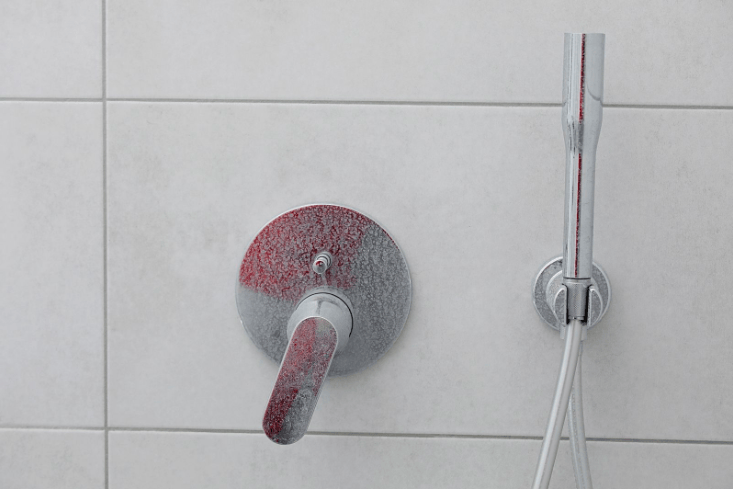Hard water stains are the persistent white or hazy marks present in dishes, bathroom doors, faucets, and clothing. These stains can be pretty stubborn but do not worry! Maintaining spotless surfaces requires knowledge of the cause, safe removal procedures, and prevention strategies which will be provided in this blog. So let’s get started:
Part 1: The Culprit Behind the Curtain - Causes of Hard Water Stains
Those stains are the result of hard water itself. It is highly saline and rich in dissolved minerals, especially magnesium and calcium. These minerals remain in the hard water and form solid deposits when the water evaporates, leading to white scaling or film that we know as hard water stains. Here's a closer look at the staining process caused by hard water:
- Mineral Deposition: As previously mentioned, mineral deposits are left behind as hard water dries. When used regularly, these accumulate and form visible stains.
- Soap Scum: Some properties of soap and detergents are inhibited by hard water. It may also lead to the formation of soap scum which sticks to the mineral collections, thus causing a stubborn discoloration.
- Etching: In extreme circumstances, metal, porcelain, or glass surfaces may genuinely get etched by hard water. Permanent markings are left behind by this etching that is difficult, if not impossible, to fully erase.
Part 2: Prevention is Key - Strategies to Stop Hard Water Stains Before They Start
There are ways to prevent hard water stains from forming in the first instance, though removing them will be challenging. Here are a few successful tactics:
- Installing a Water Softener: A water softener is a machine that eliminates the minerals present in your wellspring of water that contribute to hardness. Doing this is the best way to ensure that hard water stains are forestalled throughout the house.
- Vinegar Rinse: After using soap and water to wash your dishes, household items, faucets, and shower doors, pour a mixture of vinegar and water over these areas. This simple yet effective method neutralizes mineral residue, preventing its further accumulation and empowering you to take control of your challenging water issues.
- Squeegee Away: It is advisable to use a squeegee to eliminate any extra water from the surfaces of your bathrooms immediately after you take a shower or have cleaned them. This will help minimize the chance of minerals staying behind when the water is evaporated through evaporation.
- Cleaning Routines: Take a proactive approach by developing an effective cleaning rotation for areas that are susceptible to staining from hard water. Regularly cleaning the surfaces of shower doors, faucets, and dishes will prevent the buildup of hard water stains, making you feel in control of your home's cleanliness.
Part 3: Banishing the Battle Scars - Safe and Healthy Removal Techniques
It is possible for hard water stains to develop despite preventative measures. To get rid of them, use these safe and healthful methods:
- The Powerhouse of Vinegar: White vinegar is one of the best and most savvy natural techniques to dispose of hard water stains. Vinegar and water solution: Mix equal parts of white vinegar and water in a spray bottle. To remove the stain from the stained region, let the solution soak for 15 to 30 minutes, then gently rub the area with a wipe or a soft bristle brush. Flush with fresh water till it is spotless.
- Baking Soda Gold Rush: Sodium bicarbonate, or baking soda, is another extraordinary natural cleaner everybody should always keep at home. Use a paste of baking soda and water to scrub. Apply the paste over the stain and let it stay on for ten to fifteen minutes. After that, use a damp cloth and try to scrub gently. It is essential to rinse the inside of the mouth as well.
- The Citric Acid Savior: Citric acid may be helpful for more stubborn stains. Mix one cup of water and two tablespoons of citric acid. Apply the solution to the stain and leave it for thirty minutes. Then, use a brush to scrape the affected area. Give it a good rinse. (Note: Wear gloves when handling citric acid since it might irritate skin.)
- The DI Water Duo: Distilled water (DI water) and a microfiber cloth work well together to remove mild hard water stains. Regular tap water leaves behind some minerals that DI water removes, stopping additional discoloration. Just lightly dab the stained area with your microfiber cloth dampened with DI water. This technique works very well on smooth surfaces like stainless steel or glass.
Important Tips
- Always test a small, discrete area before using a cleaning solution on the entire stain. This makes it more likely that the solution won't harm the surface.
- Removing stains that are difficult to remove could require recurrent cleaning.
- Avoid harsh cleaning agents and bristle brushes. These may worsen the stains by scratching the surface.
- Take your time! It could take some time and effort to remove stains from hard water.
Conclusion
Although hard water stains can be an annoyance, you can avoid them and maintain a spotless home with a bit of knowledge and work. Say goodbye to those ugly markings and hello to a clean, mineral-free sanctuary by using these prevention and removal methods. See your shower doors sparkle, your faucets gleam and your dishes come out of the dishwasher looking brand new! In some cases though, there might be a requirement to call in a professional like Fresh Tech Maid. Professionals are equipped with the right experience and tools that are more effective in areas with tough water stains.

